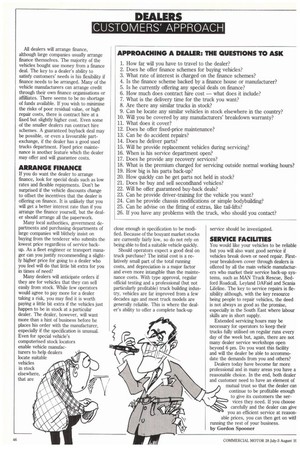DEALERS CUSTOMERS' APPROACH
Page 40

If you've noticed an error in this article please click here to report it so we can fix it.
All dealers will arrange finance, although large companies usually arrange finance themselves. The majority of the vehicles bought use money from a finance deal. The key to a dealer's ability to satisfy customers' needs is his flexibility if finance needs to be arranged. Many of the vehicle manufacturers can arrange credit through their own finance organisations or affiliates. There seems to be no shortage of funds available. If you wish to minimise the risks of poor residual value, or high repair costs, there is contract hire at a fixed but slightly higher cost. Even some of the smaller dealers run contract hire schemes. A guaranteed buyback deal may be possible, or even a favourable partexchange, if the dealer has a good used trucks department. Fixed price maintenance is another feature which the dealer may offer and will guarantee costs.
ARRANGE FINANCE
If you do want the dealer to arrange finance, look for special deals such as low rates and flexible repayments. Don't be surprised if the vehicle discounts change to offset the incentives that the dealer is offering on finance. It is unlikely that you will get a better interest rate than if you arrange the finance yourself, but the dealer should arrange all the paperwork_ Many local authorities, government departments and purchasing departments of large companies will blithely insist on buying from the tenderer who submits the lowest price regardless of service backup. As a fleet engineer or transport manager can you justify recommending a slightly higher price for going to a dealer who you feel will do that little bit extra for you in times of need?
Many dealers will anticipate orders if they are for vehicles that they can sell easily from stock. While few operators would agree to pay more for a dealer taking a risk, you may find it is worth paying a little bit extra if the vehicles just happen to be in stock at a particular dealer. The dealer, however, will want more than a hint of business before he places his order with the manufacturer, especially if the specification is unusual. Even for special vehicle's computerised stock locators enable vehicle manufac turers to help dealers locate suitable vehicles in stock elsewhere, that are close enough in specification to be modified. Because of the bouyant market stocks are currently fairly low, so do not rely on being able to find a suitable vehicle quickly.
Should operators expect a good deal on truck purchase? The initial cost is a relatively small part of the total running costs, and depreciation is a major factor and even more intangible than the maintenance costs. With type approval, regular official testing and a professional (but not particularly profitable) truck building industry, vehicles are far improved from a few decades ago and most truck models are generally reliable. This is where the dealer's ability to offer a complete back-up service should be investigated.
SERVICE FACILITIES
You would like your vehicles to be reliable but you will also want good service if vehicles break down or need repair. Firstyear breakdown cover through dealers is offered by all the main vehicle manufacturers who market their service back-up systems, such as MAN Truck Rescue, Bedford Roadcall, Leyland DAFaid and Scania Lifeline. The key to service repairs is flexibility although, with the key resource being people to repair vehicles, the deed is not always as good as the promise, especially in the South East where labour skills are in short supply.
Extended servicing hours may be necessary for operators to keep their trucks fully utilised on regular runs every day of the week but, again, there are not many dealer service workshops open beyond 6 pm. Do you want this facility and will the dealer be able to accommodate the demands from you and others?
Dealers today have become far more professional and in many areas you have a reasonable choice. In the end, both dealer and customer need to have an element of mutual trust so that the dealer can continue to be profitable enough to give its customers the ser vices they need. If you choose carefully and the dealer can give you an efficient service at reason able prices, you can then get on witt running the rest of your business.
by Gordon Spooner








































































